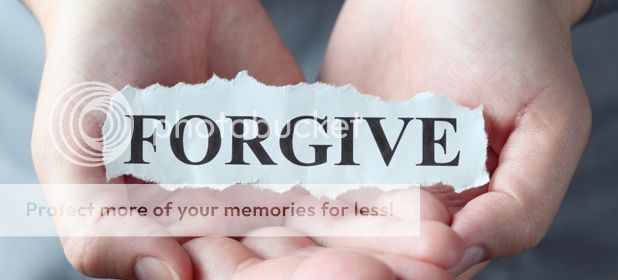“The weak can never forgive. Forgiveness is the attribute of the strong.” ~ Mahatma Gandhi
Say someone has done something that you don’t like. You get angry. You get mad. You think about it constantly. It keeps you up at night. You can’t seem to let it go. You brood about it. You may turn to vices to help you get through it. You remember every detail of the ‘infraction’ and you relive it and rehash it over and over. All this serves to do is create stress and strife in your life. It affects your health. It affects your emotions. Is it worth it?
Can you think of a similar scenario in your life? I am willing to bet you can and it has something to do with your divorce. Am I right?
You Have the Power to Fogive:
Forgiveness is a selfish act. Think about it. When YOU choose to forgive someone, it’s a decision that YOU make, and then YOU feel better. The other person doesn’t have to give YOU permission to forgive. The other person doesn’t have to accept YOUR forgiveness. YOU alone are in control of having the power to decide to forgive. How awesome is that?
People say to me, “I’m not ready to forgive yet because I don’t want that person to get away with it (whatever ‘it’ might be).” There is a popular misconception that if you forgive someone that it means he isn’t going to be held accountable for his actions. That is actually irrelevant.
Forgiving someone doesn’t mean you aren’t going to hold that person accountable.
It doesn’t mean that you are going to let that person walk all over you.
It doesn’t mean that there won’t be consequences for his actions.
It does mean that you are choosing to not dwell on it every day and let anger consume your every thought.
We all know how difficult it can be to say those three little words, “I am sorry.” Anyone with children knows how difficult it can be to get one sibling to apologize to the other for the normal acts of sibling rivalry.
As parents, we also need to teach our kids a different set of three words: “I forgive you.” Our kids need to learn and understand the power of forgiveness early on so that they learn to not hold anger inside. Teaching your kids about forgiveness is an amazing gift you can role model for them. Teaching them about forgiveness by role-modeling it in the context of your own divorce (and perhaps in the context of co-parenting these same kids for which you are being a role-model).
How to Forgive:
I am repeatedly asked, “Please teach me how to forgive.” I don’t know how to do that. I wish I did. I want everyone to feel the liberation and peace that comes with forgiveness. Some people like to “own” their anger. They make it a part of their life story and frankly enjoy carrying the burden. I think that’s a crazy load to carry. I tell people that forgiveness will happen if they are open to dropping some of the anger and looking forward to the future, instead of dwelling on the past.
Arguably the best-known scholar on forgiveness is Lewis Smedes (1921-2002). Smedes was a professor of Theology and a renowned Christian author who wrote the incredibly popular book, “Forgive and Forget.” He said, “Forgiving is love’s toughest work, and love’s biggest risk. If you twist it into something it was never meant to be, it can make you a doormat or an insufferable manipulator. Forgiving seems almost unnatural. Our sense of fairness tells us people should pay for the wrong they do. But forgiving is love’s power to break nature’s rule.”
A more modern-day quote on forgiveness came from Tyler Perry when he said, “It’s simple: when you haven’t forgiven those who’ve hurt you, you turn your back against your future. When you do forgive, you start walking forward.”
The power of forgiveness allows you to feel peace. It doesn’t mean you aren’t still going to face noise, trouble or hard work. It does mean you can be in the midst of all those things and still be calm in your heart.
Are you ready to forgive and start walking forward? Why not? What is stopping you? Don’t you want to be calm in your hear? It’s life-changing, and you can do it!


Wow! Of all the challenges faced so far on this divorce journey, this ‘forgiveness thing must rate as one of the most difficult for me.
I get really mad when forgiveness is made out to be like instant coffee, i.e. we simply say, ‘I forgive,’ and it’s done; it’s not. It’s a long, painful struggle that is worth every iota of effort when, finally having forgiven at our own pace and cost, we are able to move forward – free from bitterness and free to simply flourish and ‘be.’
Thank you for this important article, Monique, and for having the courage to say it like it is.
The most helpful resource I’ve found on forgiveness, is Desmond and Mpho Tutu’s book, ‘The Book of Forgiving: The Fourfold Path for Healing Ourselves and Our World.’ It’s deceptively short, but packs a very practical and life-giving punch:
“Transformation begins in you, wherever you are, whatever has happened, however you are suffering. Transformation is always possible. We do not heal in isolation. When we reach out and connect with one another—when we tell the story, name the hurt, grant forgiveness, and renew or release the relationship—our suffering begins to transform.”
Linked to it is the online ‘Human Journey’ Forgiveness Challenge, based on the premise that as people are helped to forgive, and thus ‘to thrive on their individual life journey so we can thrive on our collective human journey.’ (http://www.humanjourney.com/about-the-human-journey/)